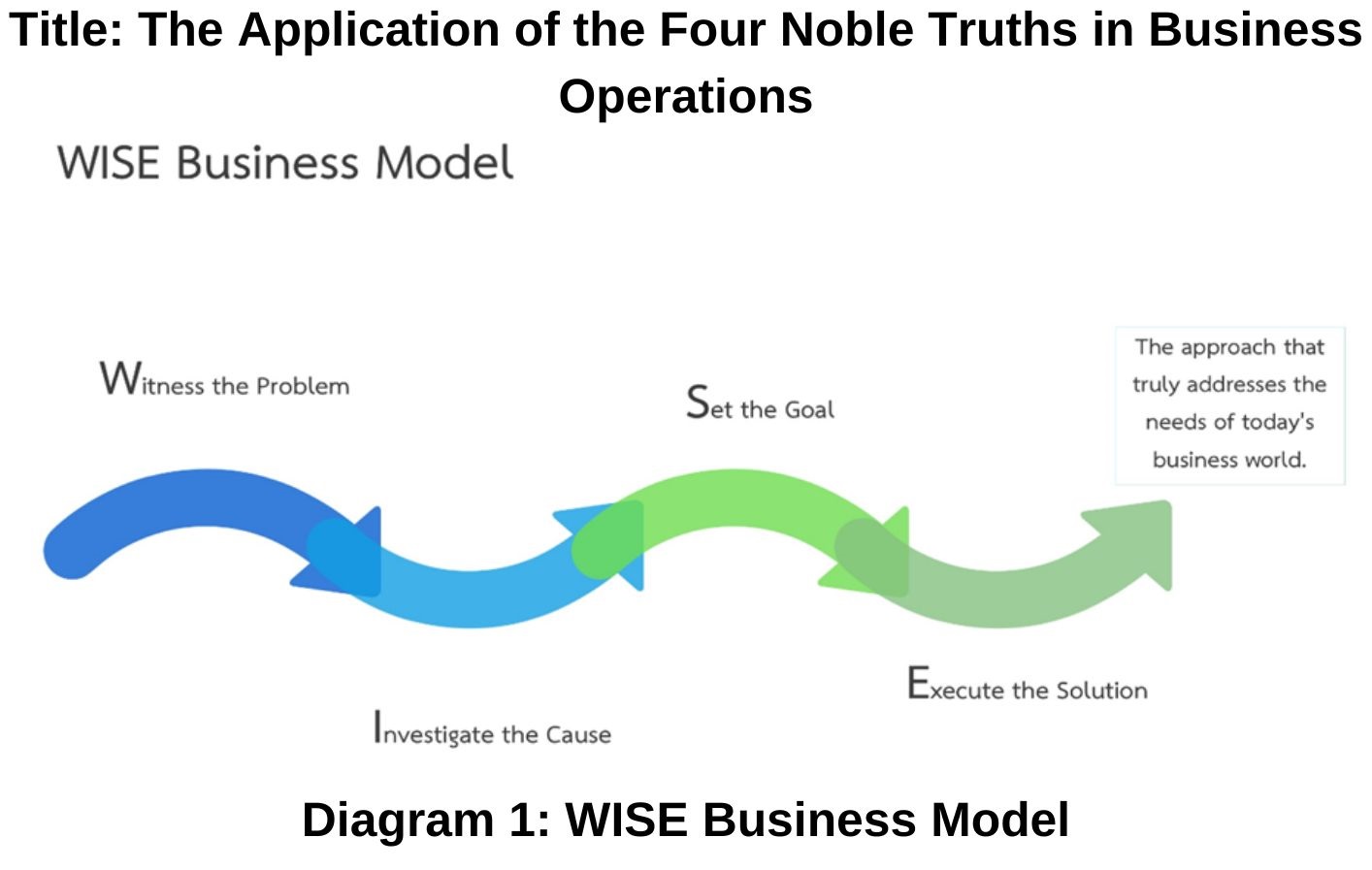The Application of the Four Noble Truths in Business Operations
Keywords:
Business, the Four Noble Truths, ApplyingAbstract
This article aims to study and apply the Four Noble Truths to business management, emphasizing problem-solving and enhancing organizational potential and sustainability. The research was conducted through qualitative methods by analyzing relevant documents and concepts. The findings reveal that the Four Noble Truths serve as a conceptual framework for systematically addressing business challenges. The process involves identifying problems (Dukkha), investigating their root causes (Samudaya), setting clear objectives for resolution (Nirodha), and formulating actionable plans (Magga). The research also developed the WISE model as a new body of knowledge to facilitate the application of these principles in business contexts. The WISE model consists of four key steps: Witness the Problem (identifying and acknowledging issues), Investigate the Cause (analyzing root causes), Set the Goal (establishing clear objectives), and Execute the Solution (implementing actions). This model enables organizations to resolve challenges systematically while balancing profitability and sustainability. The article highlights the potential of Buddhist principles to create long-term value in modern business contexts.
References
นรชัย ณ วิเชียร และคณะ. (2562). อริยสัจ 4 กับการพัฒนาองค์การ. วารสารมนุษยศาสตร์และสังคมศาสตร์ มหาวิทยาลัยธนบุรี, 13(1), 165-174.
พงศ์นคร โภชากรณ์. (2567). การบูรณาการหลักพุทธธรรมเพื่อพัฒนาการบริหารจัดการโครงการ ลงทะเบียนเพื่อสวัสดิการแห่งรัฐ. วารสารสหวิทยาการนวัตกรรมปริทรรศน์, 7(3), 170-184.
พระธรรมปิฎก (ป.อ.ปยุตฺโต). (2541). ประโยชน์สูงสุดของชีวิต. กรุงเทพฯ : ธรรมสภา.
พระพรหมคุณาภรณ์ (ป.อ. ปยุตฺโต). (2555). พจนานุกรมพุทธศาสตร์ ฉบับประมวลธรรม. (พิมพ์ครั้งที่ 32). กรุงเทพฯ : สำนักพิมพ์ผลิธัมม์.
________. (2557). พุทธธรรม ฉบับปรับขยาย. (พิมพ์ครั้งที่ 37). กรุงเทพฯ : มหาจุฬาลงกรณ์ราชวิทยาลัย.
มหาจุฬาลงกรณราชวิทยาลัย. (2539). พระไตรปิฎกภาษาไทย ฉบับมหาจุฬาลงกรณราชวิทยาลัย. กรุงเทพฯ : โรงพิมพ์มหาจุฬาลงกรณราชวิทยาลัย.
รัชตา กาญจนโรจน์ และคณะ. (2565). แบบจำลองผลการดำเนินงานทางธุรกิจของวิสาหกิจขนาดกลางและขนาดย่อม ภาคการผลิตของประเทศไทย. วารสารเศรษฐศาสตร์และกลยุทธ์การจัดการ, 9(1), 127-142.
ศิริวรรณ เสรีรัตน์. (2541). การบริหารเชิงกลยุทธ์. กรุงเทพฯ : พัฒนาศึกษา.
สุทธาพัฒน์ อมรเรืองตระกูล และคณะ. (2564). การจัดการธุรกิจที่ส่งผลต่อความสำเร็จของธุรกิจร้านกาแฟสด ในเขตอำเภอเมือง จังหวัดสมุทรสาคร. วารสารการอาชีวศึกษาภาคกลาง, 5(1), 1-10.
สุวิมล มธุรส. (2563). ปัจจัยความสําเร็จของผู้ประกอบการธุรกิจขนาดกลางและขนาดย่อม ในเขตพื้นที่ภาคกลางของประเทศไทย. ดุษฎีนิพนธ์บริหารธุรกิจดุษฎีบัณฑิต. บัณฑิตวิทยาลัย : มหาวิทยาลัยรังสิต.
อาชวัน อัศวนิก และปาณิสรา เบี้ยมุกดา. (2563). แนวทางแก้ปัญหาในองค์กร SME ในสังคมไทยตามแนวอริยสัจ 4. วารสาร มจร พุทธศาสตร์ปริทรรศน์, 4(2), 106-123.
อาภรณ์ ภู่วิทยพันธุ์. (2551). กลยุทธ์การพัฒนาทรัพยากรมนุษย์. กรุงเทพฯ : เอชอาร์ เซ็นเตอร์.
อุทัย ยอดคงดี. (2553). ความสัมพันธ์ระหวางบรรยากาศองคการกับแรงจูงใจในการปฏิบัติงานสอนของครูโรงเรียนเอกชน สังกัดสำนักงานเขตพื้นที่การศึกษา กรุงเทพมหานคร เขต 3. วารสารวิชาการมหาวิทยาลัยธนบุรี, 4(8), 81-82.

Downloads
Published
How to Cite
Issue
Section
License
Copyright (c) 2024 Institute of Sufficiency Journal

This work is licensed under a Creative Commons Attribution-NonCommercial-NoDerivatives 4.0 International License.



